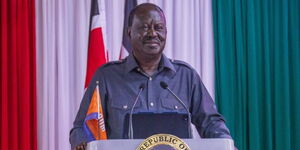High Court Sentences Former Governor Moses Lenolkulal to 8 Years, Bans Him From Office
The Anti-Corruption Court on Thursday evening ordered former Samburu Governor Moses Lenolkulal to pay Ksh84.5 million after he was found guilty of engaging in a Ksh83 million corruption scandal.
In his ruling, Justice Thomas Nzioki further banned the former county boss from applying for any public office for ten years.
According to Nzioki, Lenolkulal will also be required to pay Ksh2 million for engaging in a conflict of interest and unlawfully acquiring property with millions.
Failure by the former county governor to pay the Ksh2 million he would be forced to spend eight years in prison.
Lenolkulal's accomplice, who was accused of aiding the former governor in stealing the county funds, was ordered to pay Ksh83 million.
According to the judge, Lenolkulal's actions contravened the tenets of the constitution under leadership and integrity and by engaging in corruption, he broke the public's trust.
“There was no excuse for him to rade with the county. The acquisition of the Ksh83 million was a benefit that went to his pocket and that of his accomplice,” Judge Nzioki ruled.
“This being a corruption matter, I have considered various objectives being deterrence, retribution, denunciation and community protection.”
Lenolkulal's lawyer, while addressing the former governor's sentencing, noted his team will appeal the judge's ruling decision at the Supreme Court.
According to the ex-governor's lawyer, Lenolkulal was innocent since the county government received the services it paid to the company.
The sentencing comes a day after Moses Lenolkulal was found guilty of engaging in corruption through conflict of interest and unwarrantedly acquiring property.
Lenolkulal was found guilty of receiving Ksh83 million for the supply of petroleum products to Samburu County during his tenure.












